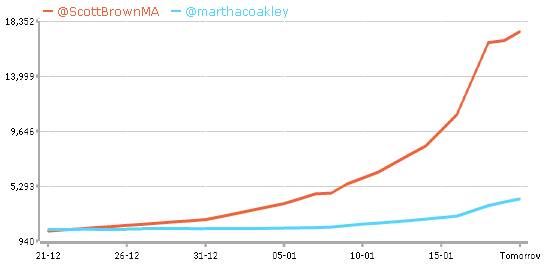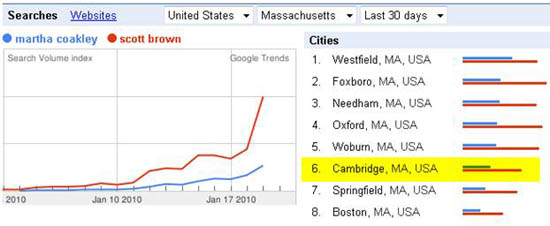Regardless of which candidate you supported in the January 19 special election to fill the seat vacated by Massachusetts Senator Edward Kennedy, there is one thing that should make Internet marketers proud: The first poll to correctly predict the election outcome was a social media poll published on Thursday, January 14.
Traditional polls were showing a close race, and before the Suffolk News 7 Poll, the Blue Mass Group/R2000 poll, the PPP Poll, PMJ/CrossTarget poll, or even the Rasmussen Poll – which all later showed Scott Brown pulling ahead – a social media poll published on the WordStream Internet Marketing blog showed that Scott Brown held a significant edge over Martha Coakley in social media engagement metrics, including:
- A 10:1 advantage in Web traffic
- A 10:1 advantage in YouTube video viewership
- A 3:1 advantage in Twitter followers
- A 4:1 advantage in Facebook followers
It concluded: “The findings (based on data collected on January 14) were staggering. The data suggests that conventional pollsters and Washington insiders have it completely wrong – it won’t be a tight race, and State Senator Scott Brown will win by a landslide … all available signs in the social media sphere currently point pretty strongly to a win by Scott Brown next week.”
The poll results which were also published in a press release the same day and were subsequently picked up in the national media, including by Russ Douthat of the New York Times and Ben Smith of Politico.com. The social media engagement metrics shifted even more strongly in Scott Brown’s favor through election night, and we all know how the story ended.
Why Social Media Polling Data Matters
Elections are essentially popularity contests. Candidates and campaign staff try to get the public excited about their candidate and their ideas, which in turn gets people motivated to volunteer, donate, and finally vote for them.
A candidate’s website is always featured in campaign flyers, commercials and stump speeches. Engaging with a candidate’s social media presence is the 21st century equivalent of making a phone call or putting up a yard sign. Here are a few key advantages of social media engagement metrics over conventional polling.
Large Volumes of Free, Real-Time Data
Conventional polling requires manual calling and compiling survey results. This is a slow and expensive process, so there’s a limit to how many people you can call. In an election, time is the enemy. Social media engagement metrics are the opposite of conventional polling data – YouTube views, Twitter followers and mentions, Web traffic estimates, blog posts and comments, Facebook fans and so on allow you to look at far larger samples, and the results are measured in real time, and are available for free.
Momentum
Graphing all this real-time data over time shows a candidate’s momentum, an important element of any race. For example, look this graph of Twitter followers (courtesy of Twitter Counter) comparing @ScottBrownMA vs. @marthacoakley – Scott Brown starts pulling ahead as early as December!

Consistent Polling Methodology
A popular approach taken by many news organizations like Real Clear Politics is to average the results of multiple polls. But every poll has different polling methodologies, including different turnout models, as well as different ways of determining likely voters. Social media engagement metrics, on the other hand, are consistent.
If you measure the same signal (even if it’s flawed) every day, and look at the change in results on a relative basis, the error cancels itself out.
Higher Resolution
For just about any question a pollster might have, there’s a search marketing or social media data point somewhere on the Internet that can give you real insight. For example, say we wanted to compare search volume on Google for two candidates, broken down by state and city? Look no further than Google Trends:

And wow – look at my hometown of Cambridge, Massachusetts (a very liberal-leaning city). Alarm bells should have been ringing at the DNC headquarters – hit the panic button!
And what about measuring demographics like veterans, women voters or other key voter segments? We could look to Facebook fan page engagement metrics of Women for Martha Coakley vs. Women for Scott Brown (which, incidentally, also showed Brown with a 15:1 advantage).
I’m not saying that social media engagement polling data is without its shortcomings, but neither is conventional polling. For example, not all voters are active Internet users, and underdogs often have the most passionate supporters. My point is that there’s clearly valuable data here, and we need to find ways to blend these social signals into conventional polling data in order to more accurately model and predict public opinion.
And Now … The Blame Game
I find it amusing to read all the post-election coverage: the hand-wringing, the recriminations, the blame game – pointing the finger at everything from a bad candidate to a poorly run campaign to strong political headwinds from Washington, DC. So jumping right into the fray, I’d like to add one more reason to the list.
I believe the biggest failure lies at the feet of National Democratic pollster Celinda Lake and other Democratic party operatives whose job it is to read and understand public opinion, which in turn drives intervention efforts and strategies – such as getting more engaged in the race earlier on (Air Force One made an emergency stop at Boston’s Logan Airport, just hours before the polls opened – oops!).
At the very least, they could have tried to reset expectations so as to avoid an embarrassing defeat. The failure to see this coming in the context of Democratic losses in New Jersey and Virginia in November, and with the entire President’s agenda at stake, is really quite shocking. Many events in our nation’s history were the result of poor intelligence gathering – the special election in Massachusetts is just another example.
I have read articles likening the Scott Brown victory in liberal Massachusetts to hell freezing over or pigs flying. But anyone looking at the social media sphere in the weeks running up to the special election would have seen the temperature dropping as pigs were gassing up on the runway, prepping for takeoff. Democratic Party pollsters were asleep at the switch.
A Bright Future for Search & Social Media Marketers
I love Internet marketing. I strongly believe it’s the most effective way to connect with people to sell products, services, or even ideas as a candidate for public office. And while President Obama, Scott Brown and many other candidates have already made progress in successfully leveraging social media and Internet technologies, I’m even more excited for the future of this interactive marketing medium.
Just as television, radio and print media make a killing in advertising revenue during election seasons, I envision an even bigger share of that financial windfall to be allocated to Internet marketing related efforts. Here are just a few of the ways I see our profession shaping future political races:
- Pollsters start factoring social media engagement signals into their forecasting models.
- Campaigns start using social media and Internet marketing technologies to test out ideas and platforms.
- Political parties use social media presence as a way to determine a candidate’s viability – currently, a candidate’s ability to raise money is king, but the ability to create buzz in the social media sphere is a prerequisite to fundraising success.
The shot heard around the world this Tuesday was first called by, of all things, a social media poll – this is great news for the long-term outlook of our profession and our industry!
Larry Kim is a search marketer and the founder of WordStream, a provider of Keyword Research and Keyword Management solutions for PPC and SEO. He lives in Cambridge, Massachusetts. You can contact Larry by email: lkim (at) wordstream (dot) com.




